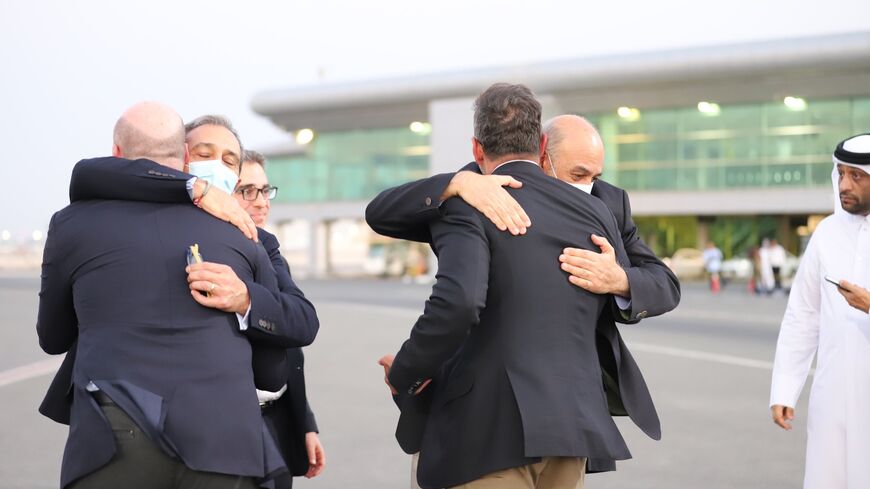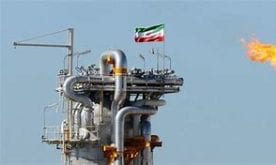Al-Monitor — Iran has freed five Americans as part of a prisoner exchange between the two longtime adversaries that also saw Tehran gain limited access to $6 billion in frozen funds.

“Today, five innocent Americans who were imprisoned in Iran are finally coming home,” President Joe Biden said in a statement, which thanked the governments of Qatar, Oman, Switzerland and South Korea for their involvement.
Biden added that the Americans “will soon be reunited with their loved ones — after enduring years of agony, uncertainty and suffering.”
The US prisoners boarded a Qatari plane that took off from Tehran’s Mehrabad International Airport on Monday afternoon local time. They were greeted by US officials during a brief stopover in Doha, the capital of Qatar, and will be flown to the Fort Belvoir Army base in northern Virginia. There, they will be reunited with their families, who spoke with Biden by phone Monday morning.
It’s unclear whether the long-awaited prisoner deal, which caps more than two years of quiet diplomacy through third countries, can lead to further cooperation between the United States and Iran. After decades of hostility, the two countries are currently at odds over Tehran’s nuclear ambitions, its support for regional militias and its provision of armed drones to Ukraine.
Iranian President Ebrahim Raisi, who is in New York for the United Nations’ annual gathering of world leaders, said Monday the swap could be “a step in the direction of a humanitarian action between us and America.”
In a major diplomatic breakthrough last month, Iran transferred four of the detained Americans from the notorious Evin Prison to a hotel in Tehran. A fifth American included in the swap was already under house arrest.
The prisoners on the US side include Siamak Namazi, a 51-year-old businessman held in Tehran since October 2015. Namazi, who was handed a 10-year prison sentence on unsubstantiated charges of “collaborating with a hostile state,” was considered the longest-held American in Iran.
Also returning to the United States is Morad Tahbaz, a 67-year-old conservationist who also holds British citizenship, and Emad Shargi, a 59-year-old businessman. Both were arrested in 2018 and imprisoned on baseless spying accusations.
The remaining two prisoners requested their identities be kept private.
Accompanying the Americans on the flight were Tahbaz’s wife, Vida Tahbaz, and Namazi’s mother, Effie Namazi. Both women are US citizens and had been barred from traveling outside of Iran.
“For almost eight years I have been dreaming of this day,” Namazi said in a statement issued after the Americans landed in the Qatari capital.
“While today the focus is on celebrating the recovery of five innocent Americans from Iran, we must renew our commitment to the fight to secure the release of all those wrongly imprisoned or taken hostage in Iran and around the world, including foreign or dual nationals,” he said.
As part of the agreement, the US government is also granting clemency to five Iranians, whose identities Al-Monitor first reported last week. All were charged with or convicted of nonviolent crimes, including sanctions-related violations. Two of the Iranians were in prison and three were awaiting trial.
As a condition of the prisoner exchange, Iran will gain limited access to $6 billion in its oil funds that were frozen in South Korea due to US sanctions. The funds were wired via the Swiss central bank to a restricted account in Qatar, where US officials say Iran can use them for the purchase of food, medicine, medical devices and agricultural products under strict US supervision.
A senior administration official briefing reporters said the United States would “take action to lock up the funds” if Iran tried to divert those assets or use them for nonhumanitarian purposes.
The arrangement garnered heavy criticism from congressional Republicans, who say unfreezing the Iranian funds amounts to a ransom payment and will only encourage more hostage-taking. On Friday, Secretary of State Antony Blinken defended what he called “a sensible arrangement.”
“When it comes to getting Americans out of jail and back home who have been unjustly detained anywhere in the world, I’m happy to … take any criticism that comes my way for that,” Blinken told Al-Monitor in a press briefing with his German counterpart Annalena Baerbock.
Not included in the deal is retired Iranian shipping captain Shahab Dalili, a legal permanent resident whose Virginia-based family had urged the administration to secure his release.
Also remaining behind bars is Jamshid Sharmahd, a regime critic and longtime resident of California who was sentenced to death in February. Neither Dalili nor Sharmahd, who also holds German citizenship, have been designated “wrongfully detained” by the State Department.
“The most crucial question and focus today should be why freedom was not secured for all US hostages,” Sharmahd’s daughter Gazelle said in a statement.
Coinciding with the prisoner release, the Biden administration announced new sanctions Monday targeting Iran’s Ministry of Intelligence and Security for its rights abuses at Evin Prison, which housed the Americans and other political detainees.
The administration also imposed sanctions on former Iranian President Mahmoud Ahmadinejad for the “constant promotion of lies” about Bob Levinson, the retired FBI agent who disappeared in Iran in 2007 and is believed to have died in Iranian custody.
The detainee release took place as Raisi arrived in New York, where he is due to address the UN General Assembly on Tuesday. US officials will not be meeting with the Iranians this week, the senior administration official told reporters.
Ali Vaez, Iran project director at the International Crisis Group, said the prisoners’ return could open the door for additional diplomacy that could lay the groundwork for a successor agreement to the 2015 nuclear deal.
“It also is a way for President Biden to score a political win by bringing Americans back home, and for the Iranians to demonstrate to their own constituents and to their opponents that even their adversaries are dealing with them — and so that’s a sign that they’re here to stay,” Vaez said.
The two sides held indirect talks facilitated by Oman in May and, in the months since, appear to have taken steps to lower tensions. Iran-backed groups haven’t attacked US forces in Syria since March, and Iran has reportedly slowed the pace at which it is accumulating near-weapons-level uranium.
But at the same time, the International Atomic Energy Agency reports that Iranian authorities continue stonewalling the agency’s inspectors, and just last week, Iran seized two foreign oil tankers in the Persian Gulf.
“We are focused daily on a policy for the Middle East that combines deterrence with diplomacy to reduce risk of Iran’s aggression,” the senior administration official said, adding that the prisoner deal “does not change our relationship with Iran in any way.”
This breaking story has been updated since first publication.
 Shabtabnews In this dark night, I have lost my way – Arise from a corner, oh you the star of guidance.
Shabtabnews In this dark night, I have lost my way – Arise from a corner, oh you the star of guidance.



